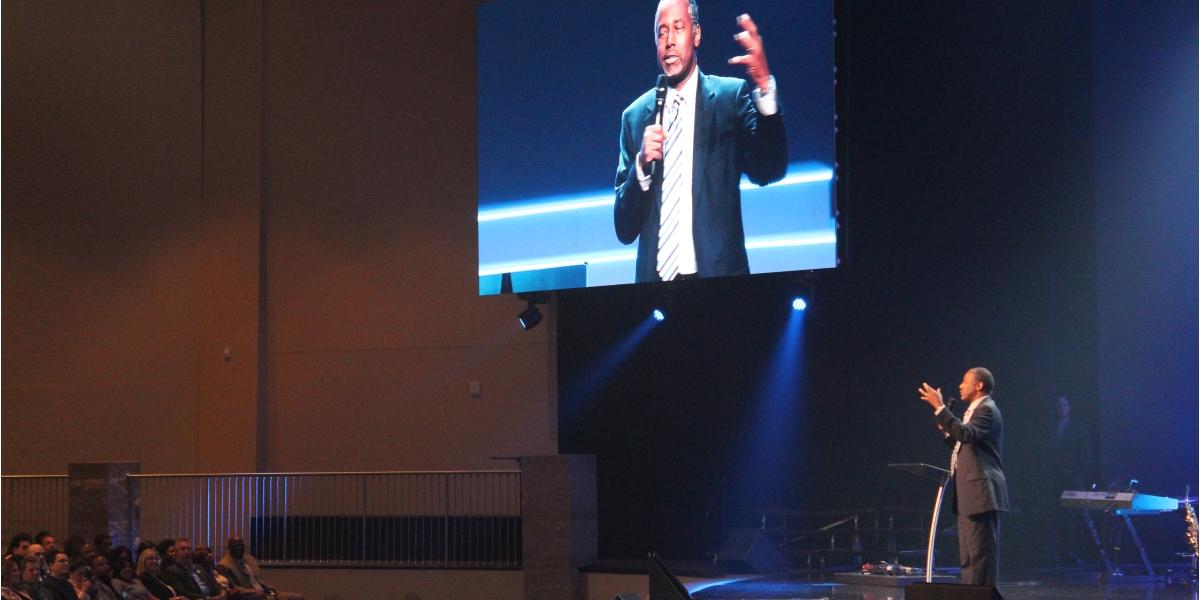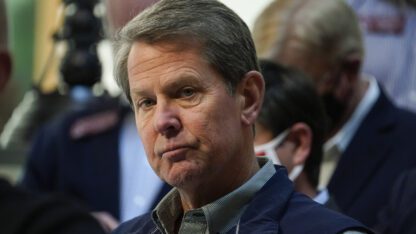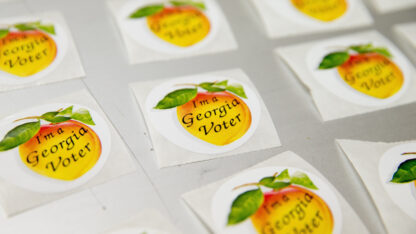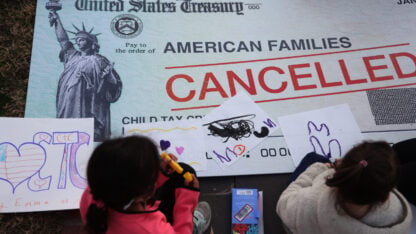Division Among Evangelicals May Affect Southern Political Power

Republican presidential candidate Ben Carson speaks to the congregation Sunday at Free Chapel church in Gainesville, Georgia.
JOHNNY KAUFFMAN / WABE
The campaign trail brought presidential hopefuls Ben Carson and Donald Trump to the Atlanta area over the weekend.
The visits show Republican candidates are already eyeing the new SEC primary on March 1. The primary was established to give the South more influence in the outcome of the race.
For decades, evangelical Christians have driven the region’s unique Republican identity, and the new primary could make the group more important than ever, but first they have to agree on a candidate.
The Leading Choices
If you forget their personalities, Trump and Carson have a lot in common.
They’re both without political experience. They’re the front-runners in the polls. And an important similarity for the South: many polls say Carson and Trump are the most popular candidates among white evangelical Christians.
Their events over the weekend were part rock concert, revival service and Fourth of July party.
Carson And Evangelicals
Before Carson spoke to the congregation at Free Chapel mega-church in Gainesville on Sunday, the pastor dropped the mic, picked up his saxophone and led the praise team in a jazzy rendition of “God Bless America.”
Once Carson got on stage, he led the congregation in prayer. During his speech, he said God has a place in government and the words “In God We Trust” should guide the country.
“So if it’s in our founding documents, it’s in our pledge, it’s our courts, and it’s on our money. But we’re not supposed to talk about it,” he said. “What in the world is that? In medicine, it’s called schizophrenia.”
That’s just what Deirdre Johnson of Duluth wanted to hear. She says Christians are being marginalized.
“There’s an atmosphere in this country that we’re coming under a lot more persecutions,” she said.
Trump And Evangelicals
Just 45 minutes south, at the North Atlanta Trade Center in Norcross, Pastor Darrell Scott introduced Trump to thousands of supporters Saturday.
“He’s [Trump] been called for such a time as this. To heal this nation. To restore respectability to this nation. To make this nation great again,” Scott said to the crowd.
Faith wasn’t Trump’s focus. But he told his own story of epiphany and redemption.
“Three months ago, I was totally establishment. I used to give fortunes. I gave $350,000 to the Governors Association,” he said. “I gave so much money, and you know what? Now I changed. All of a sudden, I’m not establishment.”
Trump’s recent rejection of mainstream Republicans, and his public statements about faith have drawn in Mike Yearick. For the Christian, support for Trump goes beyond immigration and the economy.
“He does and says the right things. He wants to take the country in the right direction. And I think he’ll be a good moral leader,” Yearick said.
The Decision
The weekend speeches by Trump and Carson were both well-received by Christians, and that’s big for Republicans in the South.
Evangelicals are the core of the party, said Josh Putnam, a political scientist at the University of Georgia.
But, he said, with evangelicals split between at least two candidates, he questions the South’s potential influence in the presidential primary.
“It’s going to be harder for the South to speak with one voice, as long as it’s unclear who the champion of evangelicals is,” Putnam said.
Evangelicals in the South have a few more months to figure out if there is one candidate they can unite behind. If they don’t, their voice in the highly touted SEC primary could lose its power.








